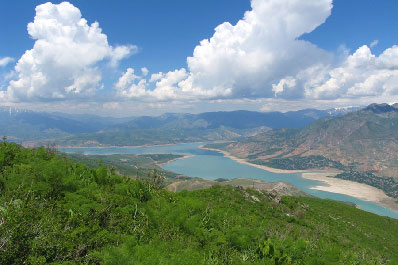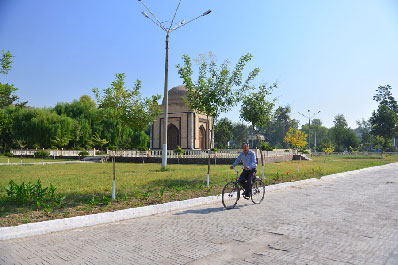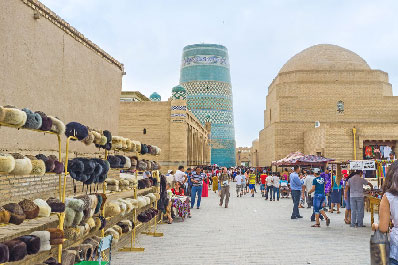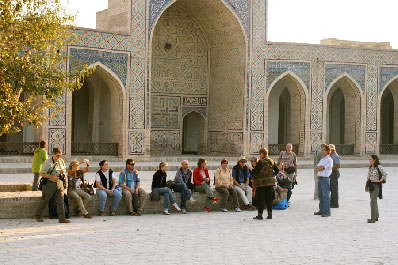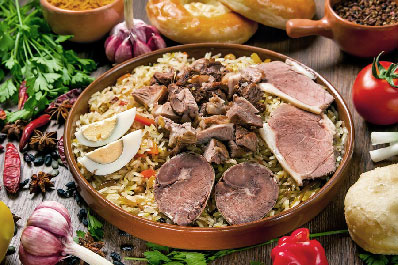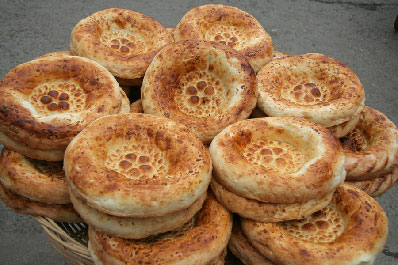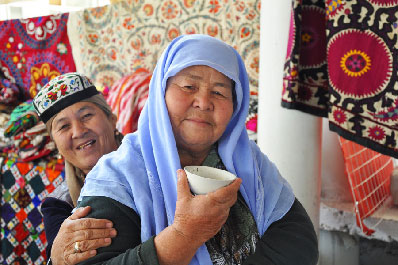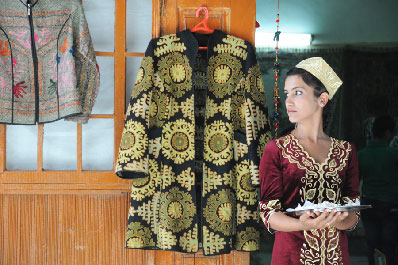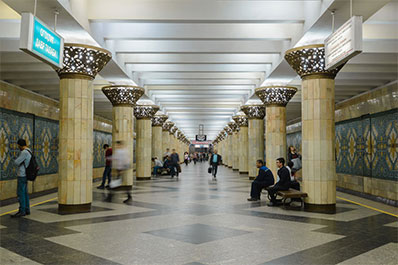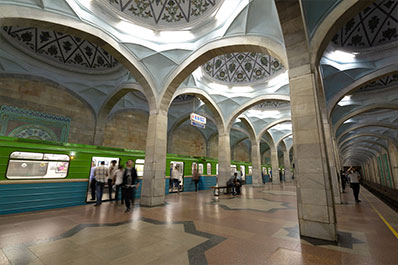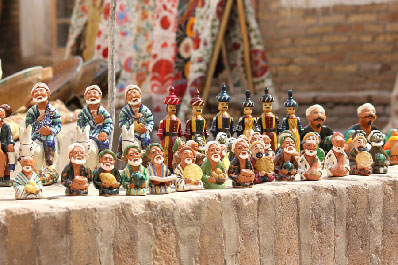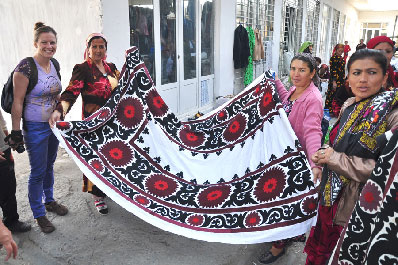Uzbekistan Travel Guide
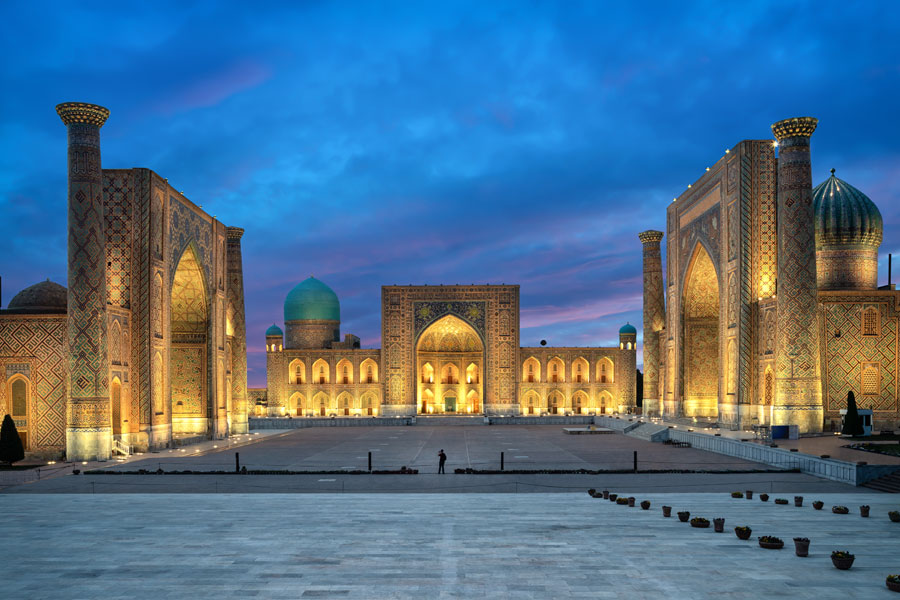
Uzbekistan is a sunny, picturesque country in the heart of Central Asia. Home to the ancient cities of Samarkand, Bukhara, Khiva, Shakhrisabz and Termez, it has countless historical and architectural monuments dating back thousands of years. Uzbekistan nature is equally captivating: the Tien Shan Mountains, Kyzyl Kum desert, Ustyurt plateau and the remnants of the Aral Sea are truly awe-inspiring.
But the true heart and experience of Uzbekistan is found within the well-preserved culture of this little landlocked country: centuries-old traditions, zoroastrian and muslim rituals, original art, and Uzbek hospitality and cuisine will be a delightful discovery for any traveler.
Browse our Uzbekistan Travel Guide to learn more information about Uzbekistan and to find the answers to your most pressing questions!
General information about Uzbekistan
Capital: Tashkent
Area: 447,400 square meters. km
Population: 38 million people.
Languages: Uzbek (state language), Russian (international, in large cities), Tajik (in Samarkand and Bukhara)
Religion: Islam - 88%, Christianity - 9%, other religions - 3%
Electricity: 220V AC, 50 A; standard double plug socket.
Time zone: + 5 hours
Internet zone: .uz
International dialing code: +998
Monetary unit: sum
What is the best time to visit Uzbekistan?
You can visit Uzbekistan at any time of year, but the optimal time to travel is spring and autumn. In spring, flowers and trees are in bloom, the mountains are blanketed with green meadows and sporadic rains refresh the air. In early autumn the climate is mild, with cool mornings and evenings, and markets filled with fresh fruits and vegetables.
Winter is often cold and snowy, and summer is very hot, with temperatures rising above + 40⁰С (104F). On the plus side, if you choose to visit during the off season, you will avoid the tourist crowds and can often get discounted prices at hotels and other venues. Summer and early autumn are also the optimal times to enjoy Uzbekistan’s fresh melons, berries and other fruits.
Our travel guides to Uzbekistan can help you plan your trip to overlap with an interesting local holiday or festival. For example, the spring holiday of Navruz is celebrated on March 21, the “Silk and Spices” festival in Bukhara takes place the last weekend of May, and the music festival “Sharq Taronalari” is held every two years at the end of August in Samarkand.
What airlines fly into Uzbekistan?
Unless you’re already in a neighboring country, the easiest way to reach Uzbekistan is definitely by plane. There are direct flights to the capital, Tashkent, from many large cities in Europe and Asia, including Moscow, New York City, Istanbul and Bangkok. There are regular flights from Moscow and St. Petersburg into other Uzbekistan cities, including Samarkand, Bukhara and Urgench.
Uzbekistan Airways, Aeroflot, Turkish Airlines, Korean Air, Air Astana, Korean Air or S7 Airlines and China Southern Airlines and Fly Dubai all offer direct flights to and from Uzbekistan.
Can I enter Uzbekistan by land?
Yes! There are several ways to enter by land. You can enter Uzbekistan by car, foot or bus across most land borders from Kazakhstan, Kyrgyzstan, Tajikistan, Turkmenistan or Afghanistan. If you choose to take a private vehicle or bus, please note that you will be required to exit the vehicle at the border and pass through customs on foot.
You can also enter Uzbekistan by train from Kazakhstan. This is cheaper than flying and a bit more expensive than crossing on foot, but it’s generally comfortable and you won’t have to drag your luggage across the border. Just be prepared for a 2-3 hour stop at the border while the train passes through customs.
Do you need a visa to travel to Uzbekistan?
Citizens of more than 60 countries can now enter Uzbekistan visa-free for up to 30 days, while citizens of more than 70 countries can use a convenient, online portal to apply for an inexpensive e-visa. In rare cases, a visa can be obtained at the airport of Tashkent on arrival.
Please visit our Uzbekistan Visa page for more information.
Do I need to register in Uzbekistan? How do I register?
All foreign citizens staying in Uzbekistan will need registration at your place of residence (hotel, hostel, guest house or private ownership). Registration is counted from the day of arrival and must be made within 72 hours of arrival in the country. Hotels and hostels will automatically register you, and now most guest houses and private residences can easily register you, as well.
There is now also a state portal at www.emehmon.uz, where you can get electronic registration. It can be filled out by either the guest or the inviting party (guest house, relatives, private individual), but currently the registration can only be completed by paying with a local Uzbekistan debit card.
What do they speak in Uzbekistan?
Uzbek, a Turkic language closely related to Uyghur, is the official language of Uzbekistan. Russian, while not an official language, is widely used in business and governmental communication, and is spoken by most people in the capital and larger cities. Tajik is spoken alongside Uzbek in Samarkand and Bukhara.In the semi-autonomous western region of Karakalpakistan, Karakalpak and Uzbek are spoken side-by-side.
Is English spoken in Uzbekistan?
English is not an official language of Uzbekistan, although those in the tourism industries and many young adults in the capital, Tashkent, know at least some English. Many major signposts are written in English, Russian and Uzbek, and the number of English speakers has been gradually increasing over the past few years. As long as you’re in the larger cities or tourist areas, you should have little problem finding someone who speaks some English.>
Is Uzbekistan in the European Union?
Uzbekistan is located in the heart of Central Asia and is not a part of the European Union. It is a member of the Commonwealth of Independent States, a coalition of independent, former Soviet Union countries.
Is Uzbekistan safe for tourists?
Violent crime in Uzbekistan is rare, and the country has been politically stable for many years. The most likely annoyance that you will face is merchants and taxi drivers who will try to overcharge you for their goods and services. Police officers who had gained a reputation in the past for doing more harm than good, are now much more helpful and unobtrusive towards tourists.
As with any place you travel, we recommend that you keep your passport and valuables in a safe place and be particularly cautious for pickpockets in crowded areas, such as bazaars and public transport. That being said, most Uzbeks are very welcoming and willing to help you in whatever way they can.
There are no vaccination requirements for Uzbekistan travel and no outbreaks of infectious diseases. Basic medications and health care is available, and there is an International Clinic in Tashkent.
The most common causes of illness among travelers to Uzbekistan usually stem from drinking tap water, eating unwashed or improperly prepared produce and meats, and sunburn or heat exhaustion during the hot summer months. By drinking bottled water, washing all fruits and vegetables thoroughly, and planning your summer excursions to avoid being out in the heat of the day, most issues can be minimized or avoided.>
Is Uzbekistan safe to travel alone?
According to the 2019 Solo Safety Travel Report, Uzbekistan ranks 5th in the world for safety and convenience for solo travelers. It can be a great place to join a group tour or meet up with other travelers in the hostels or yurt camps. For travelers who prefer solo or independent travel, Uzbekistan is a great choice for your next trip.
If you would like to join a group tour for part of your trip, or just want some helpful tips for planning your independent trip, check out our Uzbekistan tour itineraries.
Is Uzbekistan expensive?
For those on a travel budget, Uzbekistan is a great option. A typical local meal costs less than $5, and accommodations in most areas start at $6-8 for a bed in a hostel dormitory, or $12-20 for a two person room in a guesthouse.
Tourist attractions usually have two admission prices – one for local tourists and one for foreigners. The tourist price is usually $2-10 per location, and a few are free. Inter-city taxis and trains can cost between $5-25, based on the type of travel and distance (see below).
Our goal at OrexCA is to provide the best possible services to you at the lowest possible prices, so check out our special Uzbekistan tourism packages to find a service or program that works best for you.
What do they eat in Uzbekistan?
Uzbek cuisine is generally well-loved by local and international tourists alike, and each region of the country has its own special dishes or unique variations of the national dishes.
The symbol of Uzbek cuisine is plov! This rice, carrot and meat dish, while made throughout the wider region, is acknowledged by all of Central Asia to be the absolute best in Uzbekistan. The method of preparation and extra ingredients vary from city to city, so we recommend tasting the plov in every city you visit to discover the differences for yourself!
Restaurants and cafes in Uzbekistan differ in their menus: some offer international dishes, while many provide only local fare. Cafes with exclusively Uzbek cuisine usually have the words “Milliy Taomlar” in their title, which translates as “national dishes”. Restaurants with Italian, Russian, Korean or Indian cuisine are few, and most of them are concentrated in Tashkent. However, in the main tourist cities you can usually find at least one restaurant serving dishes from around the world.
Restaurants for vegetarians in Uzbekistan are rare, but vegetarian dishes can be found at many restaurants in the country, particularly in the form of soups and salads. Particularly for vegetarians, and in order to taste the best in produce that Uzbekistan has to offer, we recommend visiting between May and October, when a large variety of fruits and vegetables will be available at a low cost.
The Uzbek cuisine can often be salty, oily, fatty or heavy in onions, so we advise bringing any necessary indigestion medications with you, to have handy until you’ve adjusted to the new cuisine.
What do you wear in Uzbekistan?
For travel around Uzbekistan, it’s recommended to wear light, loose-fitting clothing, as even in spring and autumn the temperature can reach + 30⁰С (86F) during the day. For evenings, you may need a light jacket or sweater.
In the summer, short-sleeve shirts and shorts or skirts will be most comfortable.
Bring shoes that are comfortable for walking, and hiking boots if you’re planning a mountain excursion.
Uzbekistan has more than 200 sunny days a year, so sunglasses, a hat/cap and sunblock is recommended.
When visiting religious monuments, you’ll need to observe certain rules of etiquette - clothes should cover your arms and legs, and women may need to cover their heads with a scarf. Before entering some religious buildings, shoes must be removed.
What accommodations are available in Uzbekistan?
There’s a wide range of accommodations available for tourists in Uzbekistan – 4-5 star hotels in the larger cities, basic hotels at a more affordable price, guest houses, hostels, and now even homestays and Airbnb.
Apart from the upper-end resorts, most hotels in Uzbekistan retain a Soviet-style flair and meet rather basic standards of clean bathrooms, air conditioning and satellite TV. Guest houses, often run by families in their courtyard-style home, are a great option for budget travelers looking for a more authentic experience, and are especially common in Samarkand and Bukhara. Hostels and Airbnb-style apartments are more common in Tashkent than in the outer cities.
In the remote desert areas of Aydarkul, Khorezm and the Aral Sea region, yurt camps give you the option of staying the traditional nomadic tent that ancestors of this region used to call ‘home’.
Our Uzbekistan travel agents can help you to find the type of accommodation that best suits your preferences and needs.
How do you get around Uzbekistan?
One great thing about Uzbekistan is that there are plenty of options for both cross-country and intra-city travel. Trains, taxis, private cars and flights connect all of the major cities and regions of Uzbekistan, and are very low-cost compared to European and Western standards.
The capital, Tashkent, has an excellent and extensive metro and bus system. Official taxi services such as Yandex are easy to use if you have a local number or internet access. Gypsy taxis are very common and generally safe, but not recommended, particularly for those who don’t know the local languages. In the tourist areas of Samarkand, Bukhara and Khiva, you can often walk from one site to the next.
If you book a tour package through OrexCA, you will receive the help from our local, experienced travel guides to Uzbekistan to help you navigate the eager taxi drivers and local transportation system.
What is Uzbekistan famous for, and what kind of souvenirs can I bring home?
In addition to vivid photographs and memories, Uzbekistan is a great place to find inexpensive and good-quality souvenirs, oriental-style household items and handmade arts and crafts.
There’s a huge and varied selection of souvenirs in Uzbekistan: silk scarves, dresses, fabrics, shoes, jewelry, wooden and metal handicrafts, paintings and miniatures, hand-carved knives, ceramics, carpets, local embroidery... the list goes on. The cheapest souvenirs cost about a dollar, and the most expensive hand-woven carpets, up to several thousand dollars. OrexCA’s guide to Uzbekistan can help you to determine in which cities you should concentrate your souvenir shopping and where you can help support the work of local artisans.
It is important to remember that it is forbidden to export art objects from Uzbekistan, objects more than 50 years old, or anything of significant cultural value. When buying an expensive souvenir from Uzbekistan, the seller must provide a receipt and a certificate confirming that your purchase is not an antique or an important object of cultural heritage in Uzbekistan.
Can I use credit cards in Uzbekistan?
Cash is still the most common form of payment in Uzbekistan, particularly outside of the capital. You can exchange dollars, euros, rubles or other currency in banks or in exchange offices at hotels. Banks and exchange offices do not usually accept old, wrinkled or torn banknotes, and banks that do will take a commission of 10% of the nominal value. It’s harder to do a reverse exchange, from som back to your original currency, so it’s advisable to try and use all Uzbek som before leaving Uzbekistan.
The use of VISA and Mastercard is limited but gradually expanding. They’re accepted by large hotels in Tashkent, Samarkand and Bukhara, and in a small number of shops and restaurants in the capital. You can withdraw money with your debit or credit card from a number of ATMs in Tashkent, and in a few places in the other larger touristic cities.
We recommend bringing VISA over Mastercard if possible, as it is much more widely accepted. We recommend having plenty of cash on you before traveling to the outer regions, where working ATMs are much less common.
Is there good internet and cellular service in Uzbekistan?
There are five mobile operators in Uzbekistan: Beeline, Ucell, UMS, Uzmobile (all GSM standard) and Perfectum Mobile (CDMA standard). The cost of connection and tariffs for a month is about $5 (subject to local use, without calls and SMS abroad). UMS has a special tariff for tourists - the Uzbekistan Pass, a SIM card with a tariff plan that can be purchased at the international airport in Tashkent and Bukhara. To connect to other companies, you must go to the company’s head office or official dealers, and will need to show them your passport before they can issue you a SIM card.
The Internet in Uzbekistan is lagging behind world standards. Tourists traveling to Uzbekistan have two options for connecting to the global network: use Wi-Fi hotspots in hotels, restaurants and shopping centers, or purchase traffic packages with mobile Internet. Higher-speed internet can usually be found in Tashkent, and the farther from the capital you go, the lower the quality of communication.
What are the customs regulations of Uzbekistan?
The customs regulations of Uzbekistan are similar with those of many countries around the world. However, it should be noted that certain drugs that are allowed in Europe and America may contain substances whose import is prohibited or restricted in Uzbekistan.
If you’re not importing medicines that need to be declared and have less than 10000 USD in cash (or equivalent in another currency), then you do not need to fill out a customs declaration and you can go through the "green corridor".
If you have certain prescription medications and/or more than 10000 USD, then it will be necessary to fill in the customs declaration form, on which you’ll be asked to list all the money, valuables and medicines on your person. Later, when leaving Uzbekistan, you’ll need to show this original declaration at the border and also fill out a new one.
What should I expect when exiting Uzbekistan?
Before leaving Uzbekistan, make sure you have all of your necessary documents handy:
- Passport
- Proof of overnight registration (obtained at each hotel or guest house you stay in overnight, or online in advance at www.emehmon.uz
- A valid visa, meaning that you are leaving on or before the final day of the visa, or on day 30 after entry for those who aren’t required to have an Uzbekistan visa
- Customs declaration (if you were required to fill one out upon entering the country if carrying certain prescriptions or more than 10000 USD)
Note: If you filled out a customs form upon entering Uzbekistan because you were carrying more than $10000, the amount of currency that you carry out with you should not exceed the amount that you carried in. Otherwise, you’ll need to provide a document that explains the difference (for example, a bank transfer). Also, if you lose the declaration form that you filled out when entering Uzbekistan, you will be allowed to carry out no more than 10000 USD.
If you’ve found this Uzbekistan Travel Guide helpful, check out our travel guides for other Central Asian and Caucasus nations to learn more about the region!


